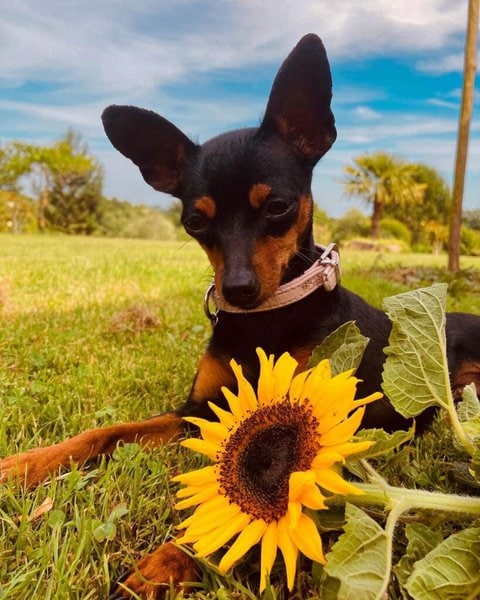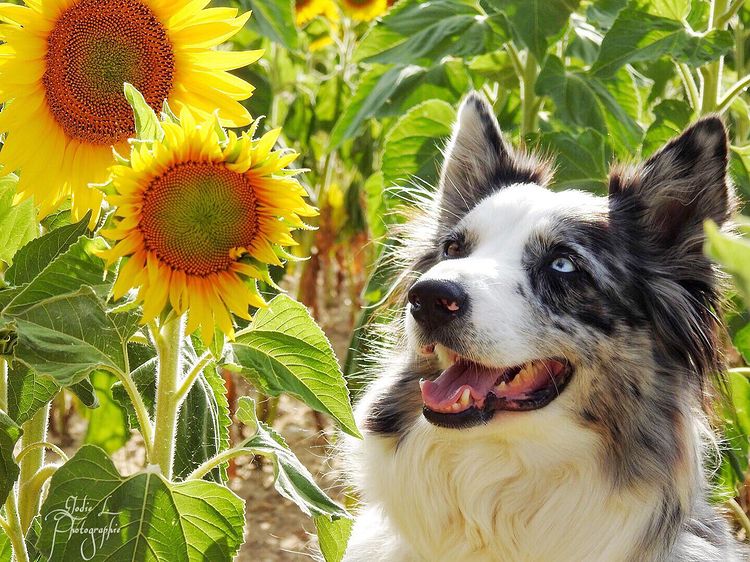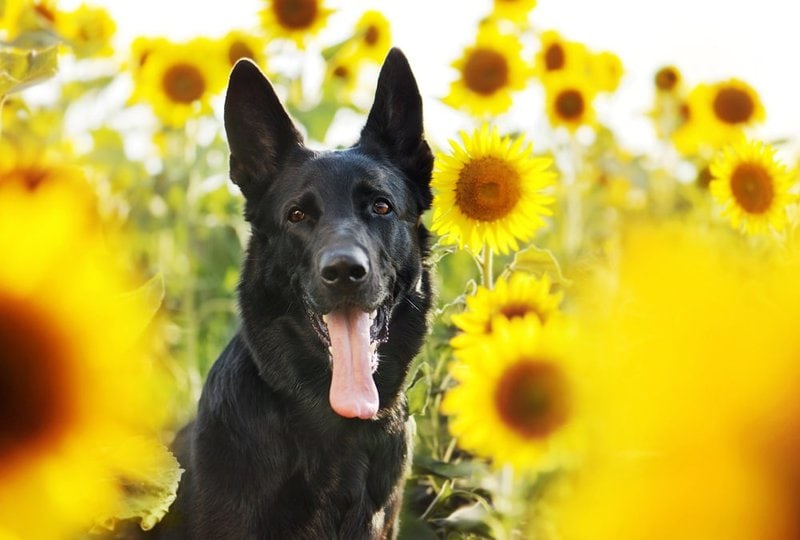As humans, we all love to eat sunflower seeds. These crunchy and delicious seeds are more than just summertime snacks. Apart from being delicious, sunflower seeds are also a nutritional source providing nutritional elements like fatty acids, minerals, proteins, and vitamins, to humans. You will be enjoying some sunflower seeds, and your dog will watch you begging to share the snack with you. So, are sunflower seeds safe for dogs?
Yes! Sunflower seeds are not only a safe treat for dogs but they also have nutritional value. They are not toxic to dogs. However, there are some key things you need to watch out for. First, sunflower seeds are only safe for dogs when served in moderation. Also, ensure that the seeds are dry, clean, and fresh.
Despite these safety guidelines, sunflower seeds provide great health benefits, from ensuring your dog has a healthy coat to supporting the immune system. However, before you allow your dog to have sunflower seeds, do your research. In this guide, we have curated everything you need to know about sunflower seeds to help you know whether it is a good idea to give your dog a bite.
Can Dogs Have Sunflower Seeds?

Yes, dogs can eat sunflower seeds, as long as you serve them in moderation and avoid certain types.
Sunflower seeds are very nutritious and powerful antioxidants. A quarter cup of sunflower seeds will have 0.2 oz of proteins, 0.14 oz of fiber, and 0.56 oz of fats. They are full of minerals and vitamins too.
However, remember that too many sunflower seeds and adding seasonings can cause health issues. Furthermore, all seeds, not just sunflower seeds, should be peeled to avoid gastrointestinal distress.
What Are Sunflower Seeds?
Sunflower seeds are simply the fruits of a sunflower plant. A sunflower plant is a tall and herbaceous plant belonging to the Asteraceae family.
They are native to the middle regions of the US but have spread all over the world. The sunflower plant is commonly known for its beauty. It has two flowers, where the main flower has yellow petals while the central section comes with hundreds of tiny flowers.
Approximately 2,000 seeds can be harvested from one flower head. The sunflower seeds have a single edible kernel inside, a black exterior shell, and are conical in shape. These seeds have a mild and nutty flavor but are also enhanced with flavors for improved taste.
Can Dogs Eat Sunflower Seed Shells?
While dogs can eat sunflower seeds, the hard outer shells should be avoided at all costs. This is because dogs can’t be able to de-shell the seeds, unlike other animals like birds and rodents.
The sunflower seed shells are rough in texture and a bit challenging for your dog’s digestive system to break down. As a result, diarrhea and other serious gastrointestinal issues may occur.
So, if you decide to allow your dog to eat sunflower seeds, be sure to remove the outer shells or buy seeds that have no shells.
Can Dogs Eat Sunflower Seed Oils?
Sunflower seed oil is a great way of serving your dog healthy fats. This is because it is low in saturated fats, unlike many animal fats.
Furthermore, the oil is said to promote cardiovascular health, boost the immune system, and improve the skin and coat health of the dog.
Just like sunflower seeds, the sunflower oils should be fed in moderation – up to 1 teaspoon of oil daily. Remember to monitor your dog to see if there are any signs of gastrointestinal upset.
Can Dogs Have Sunflower Seed Butter?
Yes, dogs can eat sunflower seed butter. Chances are, they will love it, even more than peanut butter. However, sunflower seed butter should only be given to dogs as a special treat since it is very high in calories.
Why Are Sunflower Seeds Beneficial To Dogs?

While many studies have been done based on human consumption, it is believed that the benefits can also help improve the lives of dogs as well.
Sunflower seeds provide nutritional goodness and are packed full of energy. Whether consumed as a treat or a supplement, sunflower seeds are a great addition to a dog’s diet.
Apart from being a tasty treat for your dog, here are three main benefits of sunflower seeds;
Improves Your Dog’s Coat and Skin
Studies have shown an improvement in a dog’s skin and coat after consuming sunflower seeds for an extended period of time.
This is mainly because sunflower seeds are high in essential fatty acids that are natural and free from bad fats, which may help maintain the dog’s coat and skin.
These fatty acids will ensure your dog has a shiny, full, and healthy coat with no roughness or skin conditions like dry skin, rashes, or hot spots.
Manages The Production Of Cholesterol
The fatty acids in the sunflower seeds will also encourage the dog’s body to produce good cholesterol and reduce the production of bad cholesterol. Vitamin E also helps in managing cholesterol levels.
As a result, your dog will have lower blood pressure which means less likely to develop heart diseases.
Improves The Overall Health Of The Dog’s Body
Sunflower seeds have vitamin E, which not only helps in managing cholesterol but also is helpful in the respiration of cells and the creation of membranes around the cells.
Vitamin E is a crucial antioxidant that also helps protect the dog’s skin from oxygen-free radicals and the formation of fat metabolism.
Furthermore, sunflower seeds produce a calming effect that is very helpful for dogs with anxiety. Magnesium, a key mineral in sunflower seeds, helps reduce fatigue and depression.
These seeds are also full of B-complex vitamins like niacin and pyridoxine that help improve brain activity.
In addition, sunflower seeds have tryptophan, which is an essential amino acid that increases serotonin production in the dog’s brain and this, in turn, helps reduce stress and aggressive behaviors.
How Do You Feed Sunflower Seeds To Your Dog?
When buying sunflower seeds for your dog, be sure to purchase the unsalted and peeled variety. As mentioned earlier, dogs will only enjoy the softer inner kernel of the seed, but the tougher outer shell will only cause diarrhea and other gastrointestinal diseases.
Sunflower seeds can be fed directly to your dog either as a snack or mixed with their meals, as long as you factor in the potential risks. They are extremely tasty and you will experience no troubles when getting your dog to eat them.
However, salted seeds should be avoided as they can cause heart diseases and high blood pressure.
Ensure you’re only giving your dog a maximum of one tablespoon of seeds at a time. Remember the seeds should be free from shells, seasonings, or other additives.

How Much Sunflower Seeds Should You Give Your Dog?
One cup, which is about 1.7 oz, of sunflower seeds has 269 calories. Since they are a bit high in calories, it is crucial to pay attention to the quantities.
A small dog should never consume more than 20 seeds in a week, while a large dog should not feed on more than 40 seeds in a week. You can also use these recommended amounts to make treats for your pet, for example, cookies.
In addition to being a bit high in calories, sunflower seeds are also high in fat, and consuming too much of the seeds can lead to serious health issues.
Here is how you can calculate your dog’s daily calorie requirements;
Daily Calorie Requirement = 13.64 x the weight of your dog (lbs) + 70
So, in short, dogs should only eat sunflower seeds in moderation to help them reap the full benefits of the seeds. It is important to feed dogs with not more than 1 tablespoon of sunflower seeds at a time.
What Happens If A Dog Eats Sunflower Seeds?
When your dog eats only one or a few sunflower seeds, you will probably not see any difference. However, if the dog feeds on the seeds excessively, then some health issues may occur.
First, you should look out for signs of gastrointestinal issues like diarrhea and vomiting. Puppies and small dogs may also experience an inflamed pancreas.
Remember: Dogs consuming sunflower seeds in moderation or in small quantities is fine. Avoid giving him too much to reduce the risks.
Potential Side Effects Of Sunflower Seeds In Dogs
Although we have answered the question “can dogs have sunflower seeds” with a firm “Yes,” under specific circumstances, there are still some potential side effects to be aware of when feeding sunflower seeds to dogs:
Too Much Sunflower Seeds Is Poisonous
The number of sunflower seeds you give to your dog should be severely limited. This is because the seeds are high in fats which can create troubles in the dog’s stomach and make it difficult for the stomach to break them down.
Salt And Other Seasonings Are Dangerous To Dogs
Most commercial sunflower seeds are salted because they are often made for human consumption. If your dog eats salted sunflower seeds, it may cause health conditions like sodium toxicosis.
Symptoms of sodium toxicosis may include diarrhea, vomiting, excessive thirst and urination, imbalance, and seizures.
Also, many sunflower seed products have seasonings for additional flavor. Flavored sunflower seeds can also be extremely high in sodium or sugars, which is something dogs can’t tolerate, especially when consumed in abundance.

The Shells Of Sunflower Seeds Are Dangerous To Dogs
If you’re buying sunflower seeds from a store, you’ll probably find the ones that still have shells. Unfortunately, the shells of sunflower seeds are a primary health concern for dogs.
Feeding shelled sunflower seeds to dogs can be quite problematic. This is because they are not easy to digest and can cause choking hazards.
Dogs do not have the ability to remove the hard exterior on their own. As a result, the shells will travel through the digestive tract causing potential irritation. The shells can even get trapped, causing obstructions and gastrointestinal blockage, which is life-threatening.
Some symptoms your dog is likely to experience after consuming sunflower shells include abdominal pain, diarrhea, vomiting, obstruction, etc.
Hypersensitivity Or Allergy To Sunflower Seeds
Sometimes it’s not about too much consumption. Your dog may be allergic or sensitive to some part of the whole sunflower seed, which can cause vomiting or lethargy.
If this happens, you need to visit your vet immediately. However, it is always a great idea to check if your dog is allergic by feeding it with like three seeds as a snack. If your dog shows any signs, chances are they might be allergic or hypersensitive to sunflower seeds.
You can opt for other sources of vitamin E and fatty acids like red meat, flaxseeds, eggs, or fish.
Are Sunflower Kernels Toxic To Dogs?
No, sunflower kernels are not poisonous to dogs. However, you still want to avoid the shells, which can be problematic to dogs.
Are There Better Alternatives To Sunflower Seeds?
Although there are so many benefits of sunflower seeds to dogs, there are other ways you can get similar benefits.
Some dogs may be sensitive to the seeds, making you find other options. The closest alternative to sunflower seeds would be an omega supplement that targets coat health and immune health.
You will find several dog supplements that offer a similar nutritional value and sometimes even more than sunflower seeds. These supplements may be from some type of fish oil, probiotics, flaxseed oil, and vitamins.






